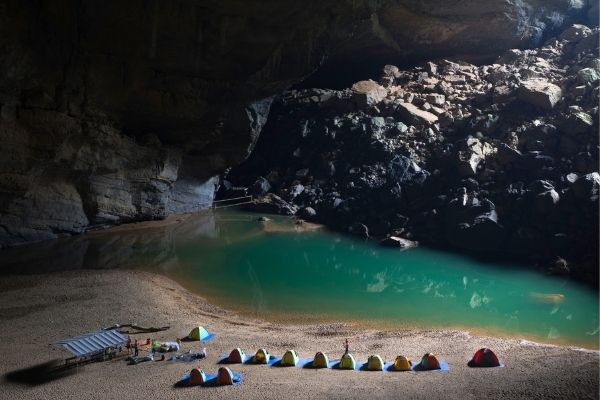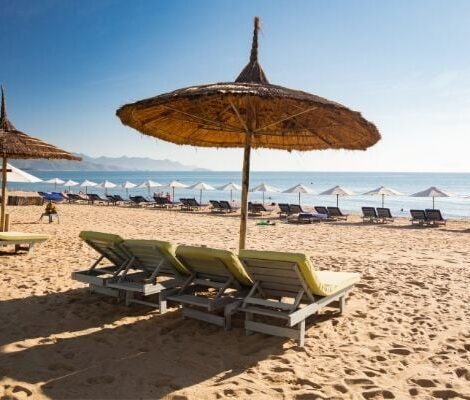With over 19 million tourists flocking to Vietnam in 2019, and spending around USD 32.76 billion each year, the government has been mulling the decision to reopen Vietnam’s tourism industry post the pandemic. Hence, in the lieu of the current COVID-19 situation, which is considered under control with most of the population fully vaccinated, the government has decided to allow the entry of international visitors from 15th March 2022.
Investing in Vietnam? See Cekindo’s Market Entry Services
However, visitors are required to be fully vaccinated and must undergo an RT-PCR test before departure and an antigen test on arrival.
During the pandemic, Vietnam left no stone unturned in combating the outbreak of the COVID-19 virus. It made news for imposing the world’s strictest border controls and aggressively worked on boosting the vaccination drive across the country. As a result, nearly 77% of its 98 million population has been vaccinated. This has instilled confidence in the hearts of travelers all over the globe to travel to Vietnam.
Pre-Pandemic Performance and Prospects of Vietnam Tourism Industry
According to the World economic forum (WEF)’s 2019 report, the competitiveness of Vietnam’s tourism industry progressed to the 63rd position out of 140 economies. Moreover, in the same year, Vietnam’s tourism industry gained recognition in the following global and regional categories of the prestigious World Travel Awards:
- World’s Leading Heritage Destination;
- World’s Best Golf Destination;
- Asia’s Leading Destination;
- Asia’s Leading Cultural Destination;
- Asia’s Leading Culinary Destination
With the advent of the COVID-19 pandemic in 2020, Vietnam tourism stood committed to implementing Political Bureau’s resolution No. 08-NQ/TW. This resolution aims at developing tourism into a key economic sector and bringing the Vietnam Tourism Development Strategy 2030 into action.
Hence, the presence of a cohesive working relationship between all relevant ministries and private stakeholders played a paramount role in carving the path of success for the tourism sector.

Why invest in the Vietnam Tourism Industry?
The tourism industry contributes heavily to Vietnam’s GDP, according to Mckinsey, and is expected to reach pre-pandemic levels revenue by 2024. Thanks to its government’s proactive campaigns, resilient economy, and implementation of the zero-case-first approach.
Following are some business domains that possess great opportunities for foreign investors:
- Medical Tourism: Compared to any other Asian country, medical tourism in Vietnam plays a significant role in boosting the tourism industry. In 2017 alone, around 80,000 international visitors came to Vietnam for medical treatment and spent around USD 2 billion.
- Airport Infrastructure: The airport infrastructure in Vietnam is still lagging behind even the tourism sector is burgeoning. Moreover, the airports are overcrowded and unable to manage the increasing number of tourists and flights. For instance, Tan Son Nhat Airport in Ho Chi Minh city is functioning at an overcapacity rate of 33%.
However, the government is committed to introducing several long-term and short-term solutions. It includes measures like counter rearrangement, reduction of restaurants, increase of waiting lounges, and relocation of airports.
- Talented Professionals: The country is experiencing a shortage of qualified professionals for its tourism industry. This gap is even more evident in the hospitality industry, where qualified employees in customer services, housekeeping, and maintenance departments are required. In order to bridge the gap, the government is taking various initiatives to impart required training to personnel.
Hence, the culmination of all these factors has set the stage for foreign investors to expand their tourism business to Vietnam.
Challenges in the Vietnam Tourism Industry
- The slow pace of digital adoption: According to a report published by Mckinsey, online travel activity made up for 19% of all the bookings made in 2018. The pandemic has pushed the ‘digital’ to the fore and the tourism sector must catch up.
- Focus on experiences: There is also a need to reinvent the traditional tourism trajectory. Travelers are now looking for offbeat experiences and activities rather than just spending time at designated tourist destinations. Platforms like Tripadvisor allow travelers to tailor their stay and experience at a destination.
- Government Involvement The government also needs to provide support in connecting suppliers to distributors and intermediaries to curate better travel packages. They should also launch campaigns and initiatives to promote Vietnam as an adventure destination.
- Diversification of tourism: There is also a need to diversify tourism and attract tourists in all the segments such as adventure tourism, medical tourism, sports tourism, and even agricultural tourism.
Investment opportunity in Vietnam: buying a hotel
If you are looking to buy a hotel or a rental property in Vietnam, you should be cognizant of all the rules and regulations that will come into play.
- Ownership: As per Vietnamese legislation, foreigners can wholly own a hotel but they need a tourist operating license to use it commercially. It is also possible to buy an existing license from a local player. The license period can range up to 50 years with a possibility to extend its validity. You can also acquire the license while you are still in your home country with the help of a local agent or consultant acting as your proxy like Cekindo
- Due Diligence: The Due Diligence process allows you to ascertain all relevant information that will be crucial to know before making the purchase. It might involve information related to any associated partners with whom the hotel conducts business, as well as any potential debts and other financial issues that may arise in the coming future. The buyer should also diligently examine the prospective hotel’s rating and make sure it is registered with the Ministry of Tourism.
- Minimum Capital Requirement: There is no minimum capital requirement when it comes to starting a business in Vietnam’s tourism industry.
Source: The ultimate guide to buying a hotel in Vietnam, as a foreigner.
